- Home
- Helen Dunmore
House of Orphans Page 2
House of Orphans Read online
Page 2
‘You ought to get out of this climate, Lotta. You’ve got the money. You could go to the south of France each winter. Take a house and sit in the sun, under the almond trees.’
She shook her head, as she always did.
‘No. My life is here, in Finland. Nobody can have two lives. What would I do in the south of France? Besides, this is where God has placed me.’
She really believed it, he knew that. It wasn’t lip service with Lotta, a bit of holy polish on a sleek life. Nor was religion, for Lotta, simply the most efficient way of stopping others from doing what they wished to do, and living the lives they might have wanted to live…
No. Don’t think of that.
‘Why do you think God has placed you here, Lotta?’ He’d never asked her that before, but after a sharp look she seemed to realize it was a genuine question.
‘To look after you,’ she said. ‘No, don’t start preening yourself. You’re not the only one. To look after you, and Erika, and Simon, and to make the house pleasant for the servants, and to raise money for charity, and to be bored, and to think that I can paint landscapes when I can’t, and to sit with people when they’re dying, and be tedious on the subject of where people choose to live and how they choose to waste their lives. And to be married to Karl.’
‘How is Erika?’ he asked, to divert her. Erika was her sister’s child, not very happily married, but very happily the mother of Simon.
‘Erika and Simon are going to St Petersburg. Frans has business there. He is being very lavish about Erika’s summer wardrobe, so all’s well for the time being.’
Lotta’s gift is to love people while knowing what they are like, he thought. Also, he’d never seen her plump up with pleasure at anyone’s misfortune.
‘But we were talking about you,’ said Lotta firmly. Her small, dark eyes were steady. Yes, she’d looked like that when she rose from Johanna’s bedside, after Johanna died. She’d folded Johanna’s hands over her breast. Minna had fallen to her knees at the bedside, her hands knotted into the sheets. She wouldn’t look, she wouldn’t see that her mother had died.
Thank God, Johanna’s eyes had been shut. There was no need to close them. He should have gone round to the other side of the bed, raised Minna up, put his arm around her shoulders, led her away. But the space between them had been as hard as iron.
‘Thomas. We were talking about you and this house. Why stay here? It’s too big for you, it’s in the middle of nowhere. Your friends can’t call round and take you out of yourself. It will make such a difference if you move into town. One of those houses by the church would suit you perfectly. So much better than being out here on your own.’
‘I like it here.’
‘I know you do. But it’s not good for you. You’ll become –’
‘What?’
‘Strange. Wrapped up in yourself. Who lives in that big old house in the forest? Oh, that’s Dr Eklund’s house. Nobody ever sees him. He wanders about when it’s dark sometimes.’
He laughed. ‘That’s not going to happen, Lotta. I’ve got my work. But you’re right that the house is too big for me. I’m going to shut up the top floor, and move my bedroom and study downstairs. Jenny doesn’t want to stay, and Kirstin’ll go with her. One girl can do all the work that’s necessary for a single man. The laundry will be sent out, and Matti will take care of the garden and stables as usual. There’s no need for anything more.’
‘It doesn’t sound very cheerful.’
‘I’m a widower, Lotta. It doesn’t have to sound very cheerful.’
‘What about Minna?’
He looked away. The catch on the window frame still hadn’t been mended. Johanna had asked him about it months ago, in her cool, crisp voice that expected results. He’d forgotten. Minna and Johanna didn’t forget such things.
‘I don’t imagine she’ll be here very often, now that her mother’s dead.’
Lotta was silent. She knew as well as he did that it was true.
Why has God placed you here, Lotta?
To look after you.
Lotta sat by Johanna until she died. She folded Johanna’s hands. I couldn’t do it. Couldn’t take her hands while they were still warm and soft, and feel them unresisting as I placed them on her breast. It was too final. I felt ashamed, that Johanna lay there while I could stand up and walk away.
Johanna’s breasts were beautiful. That day I came into the dining room of her father’s house, and she was placed beside me. She looked down. She was wearing a dark dress, with a high round neck. Every so often she caught her breath, and her breasts rose.
I didn’t know then that she caught her breath because she’d been crying upstairs for hours before dinner. She loved a little shit who’d made a fool of her, drawing her on, letting her show him her love, enjoying the excitement that not even Johanna could completely hide. He wanted her to show her love so that he could reject it. There are men like that, and women too. So she sat there with that catch in her breath, full of grief and fury that I didn’t understand until months later. As often as I dared, I would glance at the fullness of her breasts under that dark material that was a little bit shiny, not very, but just enough for the light to change on it as her breasts rose and fell.
And that’s why we married, Lotta, and is it any wonder that we were unhappy? I came along, and Johanna knew from the first day that I was completely crazy about those breasts and wouldn’t be happy until I’d got to them. Not that she would have put it to herself as crudely as that. She married me as fast as she could, so that he would never guess – that other one – he would never know how much he’d wounded her. No one would ever, ever know and Johanna would be smiling and beautiful in her wedding dress. She would have won her victory, even if the only person who suffered from it was herself. That was the guiding principle of Johanna’s life. To win, or if she couldn’t win, to refuse to let her losses be known.
No, I couldn’t have folded those hands on Johanna’s breast. I didn’t have the right, anyway. You think God has placed you here to look after me, Lotta, but you wouldn’t be so confident if you knew what kind of man I am.
‘So you’re going to keep this house on,’ said Lotta. ‘All right. And you need a girl to cook and clean. One girl’s going to do all that?’
‘I told you. Most of the house will be shut up. I won’t dine at home more than three or four times a week.’
‘How depressing… Well, never mind. Let’s think of the practicalities. Where’s this girl to come from?’
‘I haven’t thought that far ahead, Lotta.’
‘Hmm – what about the orphanage? They give them a good training there, and she won’t be homesick.’
‘That’s a good idea,’ he said slowly. That girl: Eeva. He heard the whisking of her broom on the boards. The sick child had lived. Anna-Liisa was surprised at the tenacity Eeva had shown. Not one night, but three she’d spent sitting on that little stool, spooning water into the child.
‘And do you know, Dr Eklund, you’ll scarcely believe it but that sick little girl has been adopted! Yes! By a good family – farmers. The wife has no children, although they’ve been married ten years, and she happened to see our little Annika in church one Sunday. Once the child recovered she turned out to be pretty, really very pretty. It’s always the way. The pretty little girls get taken, and the boys are left behind until they’re old enough to work.’
Anna-Liisa spoke with broad good humour, as if there were no questioning the ways of the world.
‘So Eeva doesn’t see the child any more?’ he asked.
‘Oh no! Bless you, why ever should she? Little Annika’s got her new life now and we don’t want to hold her back. They don’t like to think of the child as it was before, you see, Doctor, living in an orphanage and all that. They like to think of it as their own, and that’s fair enough, especially when it’s a pretty little thing like Annika turned out to be, that any mother would be proud of.’
‘I suppose you’re right.’
But the girl with the broom had gone, in all likelihood. She’d have been found a place. It must be a year ago or more now; yes, Johanna was just beginning to be ill.
‘There’s a girl who might be suitable,’ he said to Lotta. ‘She would be about the right age. She seemed to have plenty of energy, and to be teachable.’
‘That’s all you want,’ agreed Lotta. ‘Better to take a girl who hasn’t any experience, and shape her to your ways, than get some little madam who thinks she knows everything and won’t do what she’s told –’
He nodded, to stop Lotta launching into one of her favourite topics.
‘I’ll call on Anna-Liisa, and find out if the girl is available,’ he said.
‘What’s her name? The girl? I might have heard of her.’
‘Not very likely. She was sent up from Helsingfors under some new scheme they’ve got. Her first name is Eeva, but I didn’t hear the surname.’
‘Eeva?’ Lotta tasted the name. ‘Wouldn’t you rather have a Swedish-speaking girl?’
He thought back, surprised. Anna-Liisa had been speaking Swedish, out of courtesy to him. And the girl had spoken Swedish too, he was sure of it.
‘She speaks Swedish, and understands it too,’ he said. ‘Besides, I like to speak Finnish. It’s in keeping with the spirit of the times,’ he added, smiling. Lotta, he knew, spoke Finnish badly and was irritated by talk of fennicization. We are Swedish Finns, as we have always been, and that’s good enough for me, she would say.
Not quite always, he wanted to say. Didn’t our ancestors come over here from Sweden sometime? But if he joked on that subject, Lotta would flush with annoyance and retort, Everyone came from somewhere else at some time, if you go back far enough, Thomas, as you very well know. Didn’t the Finnish language itself originate in India? We belong here, as much as they do.
‘Anyway, the girl has probably got a place already,’ he said aloud.
But she had not, even though she was older than he’d thought. Sixteen past, said Anna-Liisa, as they sat drinking coffee. She’d turned sixteen in January. So that skinny child he’d seen sweeping the floor must have been at least fifteen. Strange that a place hadn’t been found for her already.
‘Yes, it is unusual,’ said Anna-Liisa, looking fat and comfortable with secrets. ‘Another cup of coffee, Dr Eklund? There are particular reasons why it was felt best for her to work for us, past the usual age. She’s a hard-working girl, on the whole.’ Anna-Liisa’s voice trailed off dubiously, and he wondered what the parts of that whole might be. ‘Yes, she’s hard-working and she’s quick,’ went on Anna-Liisa, more definitely now, surer of her ground. ‘You don’t have to explain things to her twice. This past year I’ve been teaching her to cook and put up preserves. She can dry and pickle mushrooms, pickle cucumbers, and make jam.’
‘Excellent.’
‘You’ll find sometimes… Well, Eeva likes to do things her own way. It’s not that she argues, but she has a way of looking back at you which isn’t right, and I’ve told her so many times.’
Obviously without result, he thought.
‘She likes the little ones. She helps them wash and dress and make their beds. It’s part of her duties.’
‘I hope she won’t find it too quiet. There’s only Matti for the garden and the stables, and old Agneta comes up from the village to char. But they don’t live in.’
‘Oh no, no. Too quiet, no, that won’t be a problem at all. It’s a great advantage for her, Doctor – a real opportunity. There aren’t many of our girls who can find a place like this, working for a doctor’s household. I sent off one of our girls this morning, younger than Eeva she was, to a farm with five children under six and mud traipsed in from dawn to dusk, as you know, and there’s no other servant kept. Well, it’s right and proper and it’s what has to be, but I’m glad to give Eeva her chance.’
‘Those “particular reasons”,’ he said carefully. ‘Is there anything I should know?’
Anna-Liisa picked out a cardamon biscuit. Her colour was high.
‘There was a question of her moral welfare, back where she was in Helsinki. Helsingfors, that is,’ she added hastily, deferring to his Swedishness. ‘You take my meaning. There were special considerations. It was thought best for her to leave the city and go right away from any influences there might be. When she was put here with us I was told she wasn’t to be sent out to a place until she was sixteen.’
‘She’s turned sixteen, you say.’
‘Oh, there’ll be no difficulty. Not with her going to you. It’s if they go off to a farm or even a town house where there are young men hanging about. They get taken advantage of and before you know it they’re bringing a baby back to mother.’ Anna-Liisa gave an unexpectedly loud laugh. ‘Or, since they’ve got no mothers, back they come to us, and the whole thing starts all over again. They say they want to keep the baby, they beg and promise all manner of things, but of course they can’t. And then you’ve a hard job to get them fixed up in a decent place a second time. And so they drift – and like as not it happens again. You don’t know whether to laugh or cry’
‘No,’ he said. He looked at Anna-Liisa thoughtfully. Whatever did she really make of all this? She wasn’t married. Presumably she was a virgin. And yet that laugh – as if everything that led to the making of those babies was an enormous joke in which she assumed he’d share.
‘You’ll be glad to know that Matti is close to fifty and has bow legs,’ he said.
‘She won’t try anything on under your roof. She’s an intelligent girl, I’ll say that for her, she won’t foul her own nest. I’ll ring for her now.’
‘Wait a moment,’ he said sharply. He wasn’t ready to see Eeva yet. Their talk of her hung in the room like dirty laundry. ‘Let’s get the practicalities out of the way. When she’ll come. Her wages. Does she need clothes? You’ll have to forgive me, I’m not used to all this. Johanna dealt with everything concerning the servants.’
‘Of course. I always say, it’s more difficult for the man when he finds himself alone. He’s like a babe unborn.’
He leaned back, wishing he could shut his eyes. Why did he still have that feeling – soiled, uneasy – as if he’d done something wrong and that if people knew the truth they would shun him? Anna-Liisa’s large, worn face was full of sympathy. She had spread a cloth on the table and offered him biscuits she’d baked herself. He knew that these half-hours taking coffee with him in the clean pallor of her little sitting room were precious to her.
Her life was work. The care of the children was only a part of it. She had to keep the Board happy, flatter her visitors, show herself loudly grateful to anyone in the town who sent a free load of wood or a bag of potatoes to the House of Orphans, make a fat farmer’s wife feel like a benefactress when she took on a child to slave from dawn to dusk for half-nothing, and carry her crew of souls to the Lutheran Church twice every Sunday so that the town could judge her by their clothing, cleanliness and behaviour.
But he understood her difficulties; or at least, for some reason she thought that he did. She could confide in him about ringworm and measles outbreaks, about a child who wouldn’t speak and looked away even when you framed her face with your hands, about a girl who knew every obscenity under the sun, about bereaved children who put up their arms to be carried every time they saw Anna-Liisa, when they first came. But she didn’t pick them up, and soon they abandoned the habit for ever. They have to learn, but it’s hard sometimes.
The wintry light fell on the polished wooden floor, the deep red rug, the tiled stove. Next month would be April, and spring would come. Already it was a year since he’d first known that Johanna would die. The year turns around and it can’t be stopped. This year, the thought of spring’s power was a relief. It would happen in spite of him. He could no more resist it than he could resist death. Its desire for new life would brush him aside, if it couldn’t sweep him up with it.
But maybe it could. He could begin again. He was not s
o guilty that he had to lock himself away. Johanna was dead. He would make a new life. He wouldn’t expect Minna to come and visit him.
He wanted to get up and walk about the room. Such a revelation, such a discovery. After death, there was life. What could be more obvious, more stupidly obvious? And yet he hadn’t seen it until now, until this very minute sitting in the House of Orphans.
He would travel more, take his part in life. He would write up his cases more systematically, read the medical journals, make his contribution. Why had he fallen into believing that all the fruits of life were for other people, who were somehow more active or more suitable to receive them?
He would work in the big back sitting room, with his desk in front of the window. That would be his new study. It had the best view in the house, over a slope of lilac and birch and cherry trees, down to the deep cleft where the stream ran in summer. Soon the stream would unfreeze. He’d be startled one morning to hear the sound of water running. The first rush of water sounded so loud, then you got used to it. And beyond the stream, the forest, rising again up towards the ridge where it made a shaggy horizon. Dark now, dusty with winter, but even the spruce and larch would push out sparks of brilliant green before long. And beyond the forest, the forest. Nothing but forest eastward, whether you walked for a day or a week or a year. How happy that made him.
Johanna didn’t like it. She wanted him to cut back the birches and cherry trees. They spoiled the view, she said. All these trees crowding up to the house made her feel closed in. Oppressed.
He’d taken Matti’s axe and made a notch in the skin of a young birch. He was twenty years younger and stronger then. The tree was full of sap, slippery with it. He swung at it badly, hacking the trunk. The mess of it stirred his temper and he lifted the axe again, too fast, not really seeing what he was doing. It missed the notch and skidded down the trunk. Pure luck that it didn’t embed itself in his foot.

 The Ingo Chronicles: Stormswept
The Ingo Chronicles: Stormswept The Deep
The Deep The Crossing of Ingo
The Crossing of Ingo Birdcage Walk
Birdcage Walk Glad of These Times
Glad of These Times Counting the Stars
Counting the Stars With Your Crooked Heart
With Your Crooked Heart Burning Bright
Burning Bright House of Orphans
House of Orphans Mourning Ruby
Mourning Ruby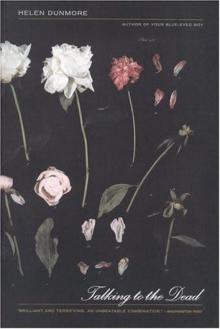 Talking to the Dead
Talking to the Dead Exposure
Exposure Ingo
Ingo The Malarkey
The Malarkey Love of Fat Men
Love of Fat Men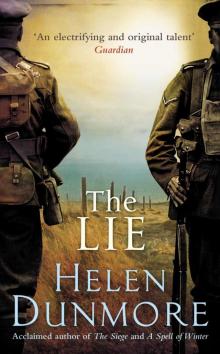 The Lie
The Lie The Siege
The Siege Inside the Wave
Inside the Wave Counting Backwards
Counting Backwards The Land Lubbers Lying Down Below (Penguin Specials)
The Land Lubbers Lying Down Below (Penguin Specials) The Greatcoat
The Greatcoat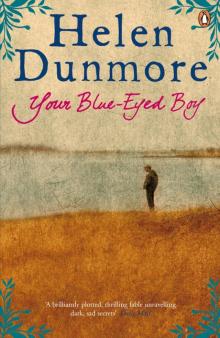 Your Blue Eyed Boy
Your Blue Eyed Boy Zennor in Darkness
Zennor in Darkness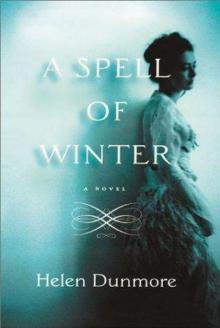 Spell of Winter
Spell of Winter Out of the Blue: Poems 1975-2001
Out of the Blue: Poems 1975-2001 Tide Knot
Tide Knot The Betrayal
The Betrayal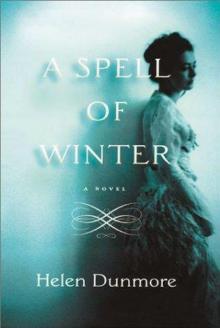 A Spell of Winter
A Spell of Winter Out of the Blue
Out of the Blue The Tide Knot
The Tide Knot Girl, Balancing & Other Stories
Girl, Balancing & Other Stories Betrayal
Betrayal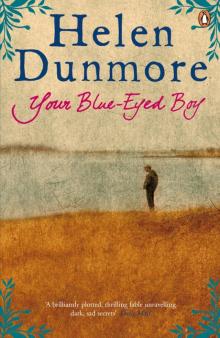 Your Blue-Eyed Boy
Your Blue-Eyed Boy